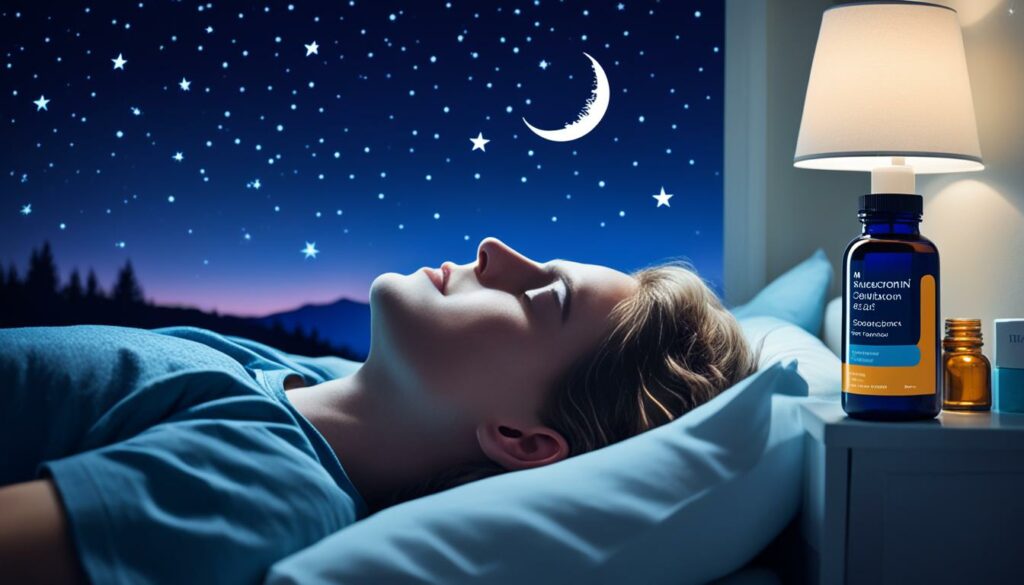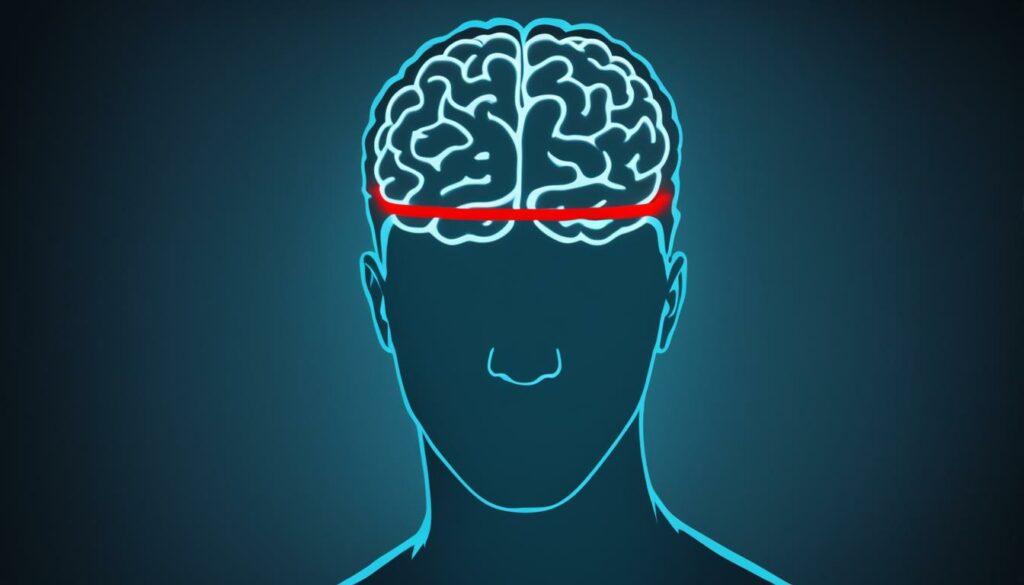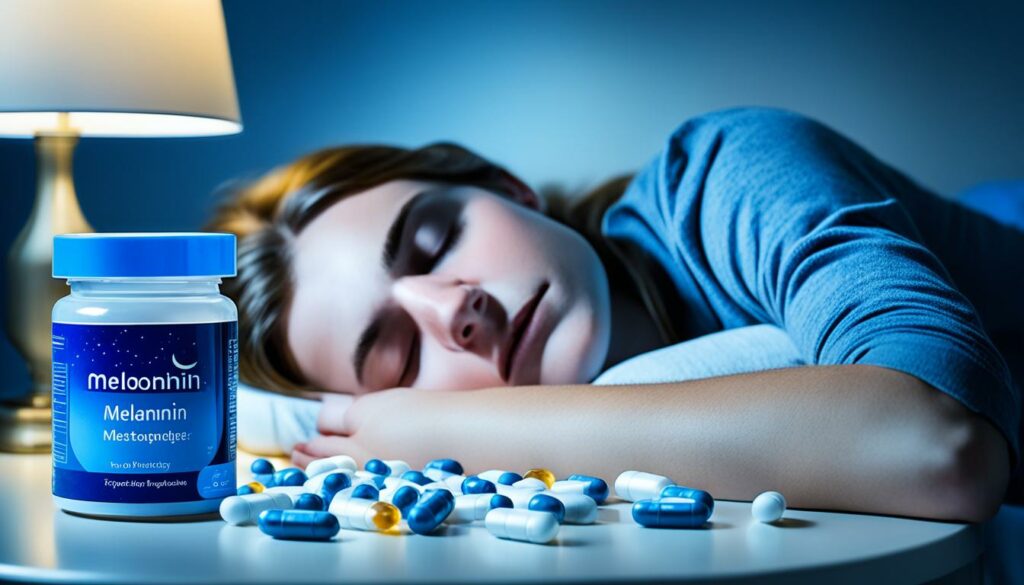Is Melatonin Safe for Teens? Expert Insights
Melatonin is a commonly used sleep aid for adults, but its safety and effectiveness for teenagers have been a topic of debate. As a parent or caregiver, you may be wondering if melatonin is a suitable option for your teen’s sleep issues. Let’s explore expert insights on melatonin use in teenagers and understand the potential risks and benefits.
Key Takeaways:
- The safety and efficacy of melatonin use in teenagers are still being studied.
- Melatonin is not FDA-approved for use in children and adolescents with sleep disorders.
- Consult with a healthcare professional before administering melatonin to a teenager.
- Consider alternative strategies and lifestyle modifications before resorting to melatonin use.
- Address underlying sleep issues and consult with healthcare professionals for personalized guidance.
Melatonin Overview and Safety Concerns for Teens

Melatonin is a hormone that plays a crucial role in regulating the sleep-wake cycle. It is produced by the pineal gland in the brain, and its levels naturally rise in the evening, signaling the body that it’s time to sleep. While melatonin supplementation has been widely used in adults as a sleep aid, its safety and efficacy in teenagers are still being researched.
Studies have shown that melatonin can be helpful for children with sleep disorders, particularly those with ADHD and autism. However, the safety of melatonin for adolescents and its potential effects on hormonal development and other health factors are not yet fully understood. As a result, the use of melatonin in teenagers should be approached with caution and under the guidance of healthcare professionals.
It is worth noting that the American Academy of Pediatrics (AAP) advises against the use of melatonin in children under 5 years old. This recommendation is based on limited research on melatonin use in young children and the potential risks associated with its use at such a young age.
Considering the concerns surrounding melatonin use in teenagers, it is essential for parents and healthcare professionals to have open discussions about its potential benefits, risks, and appropriate usage. This collaborative approach can help ensure that melatonin is used safely and effectively in teenagers who may benefit from its sleep-regulating properties.
Benefits of Melatonin for Teen Sleep Disorders
While research on melatonin use in teenagers is still ongoing, some studies have shown promising results.
“Melatonin may help improve sleep onset and quantity in teenagers with ADHD and autism, who often experience difficulties falling asleep and maintaining a consistent sleep pattern.”
These findings suggest that melatonin may have a positive impact on sleep quality for teenagers with certain sleep disorders. However, it is important to balance the potential benefits with the uncertain long-term effects and safety considerations.
It is crucial to consult with healthcare professionals who have an understanding of melatonin usage in adolescents. They can provide personalized recommendations and help monitor any potential side effects or interactions with medications, ensuring the safe use of melatonin for teenage sleep issues.
Research on Melatonin Use in Teens
Limited research has been conducted on the use of melatonin specifically in teenagers. While studies have focused on melatonin’s effectiveness in improving sleep in adults and children, there is still much to learn about its impact on adolescent health. However, some studies have explored the use of melatonin in teenagers with specific conditions such as ADHD and autism, providing insights into its potential benefits.
Research has shown that melatonin can be effective in improving sleep onset and quantity in teenagers with ADHD and autism. These conditions often result in sleep disturbances, and melatonin supplementation has been found to help regulate the sleep-wake cycle and improve sleep quality in these individuals. In one study, teenage participants with ADHD reported reduced sleep latency and increased sleep duration after using melatonin supplements.
While these findings are promising, it is important to acknowledge that the long-term side effects of melatonin on teenagers are not fully understood. More research is needed to determine the potential risks and benefits of melatonin use in adolescent health. It is crucial for parents and teenagers to work closely with healthcare professionals to monitor any potential side effects and determine the appropriate dosage and timing for melatonin use.
Expert Insight: “While melatonin has shown promise in improving sleep in teenagers with ADHD and autism, it is important to tread cautiously. We need more research to fully understand the safety and long-term effects of melatonin in adolescents.”
It is also worth noting that melatonin supplements are not heavily regulated by the FDA, and the actual melatonin content may vary significantly between different products. This lack of regulation makes it even more important for parents and teenagers to consult with healthcare professionals before considering melatonin use.
Overall, while melatonin may offer benefits in improving sleep in certain teenagers, its use should be approached with caution. More research is needed to better understand its impact on adolescent health and to determine the most effective and safe dosage and timing for melatonin supplementation.
Risks and Considerations for Melatonin Use in Teens

Potential Side Effects of Melatonin in Teenagers
While melatonin is generally considered safe for short-term use in teenagers, it is important to be aware of potential risks and side effects. Some common side effects of melatonin in teenagers may include:
- Drowsiness: Melatonin can make teenagers feel sleepy and groggy, especially if taken during the day or in higher doses.
- Headaches: Some teenagers may experience headaches as a side effect of melatonin use.
- Agitation: In rare cases, melatonin can cause restlessness or irritability in teenagers.
- Increased Bedwetting or Urination in the Evening: Melatonin can affect the body’s fluid balance, leading to increased bedwetting or urination at night.
It is important for parents and teenagers to monitor these potential side effects and consult with healthcare professionals if they occur.
Variability in Melatonin Supplements
Another consideration when using melatonin in teenagers is the variability in the content of melatonin supplements. Unlike prescription medications, melatonin supplements are not heavily regulated by the FDA. This means that the actual melatonin content in different products may vary significantly, which can impact its effectiveness.
Parents should carefully read the labels of melatonin supplements and choose reputable brands that adhere to quality standards. Consulting with healthcare professionals can also provide guidance on selecting the right melatonin product for teenagers.
Alternative Strategies and Consultation with Professionals
Before deciding to use melatonin for teenagers, it is recommended to explore alternative strategies for improving sleep. These may include:
- Establishing a consistent bedtime routine
- Limiting screen time before bed
- Creating a sleep-friendly environment
- Practicing good sleep hygiene
These behavioral interventions can help improve sleep quality and may alleviate the need for melatonin use.
Furthermore, consulting with healthcare professionals is crucial to ensure the appropriate use of melatonin and to address any concerns or underlying sleep issues in teenagers.
| Side Effects | Considerations |
|---|---|
| Drowsiness | Monitor daytime sleepiness and adjust dosage if necessary. Avoid driving or operating machinery while experiencing drowsiness. |
| Headaches | If headaches persist or worsen, consult with healthcare professionals. |
| Agitation | If restlessness or irritability occur, discontinue melatonin use and seek medical advice. |
| Increased Bedwetting or Urination in the Evening | Monitor fluid intake and consider reducing melatonin dosage or switching to a different sleep aid if the issue persists. |
| Variability in Melatonin Supplements | Read product labels carefully, choose reputable brands, and consult with healthcare professionals for guidance on the appropriate melatonin product. |
Recommendations for Teen Sleep Issues

When it comes to addressing sleep problems in teenagers, it’s important to consider alternative strategies and lifestyle modifications before considering melatonin use. While melatonin can be beneficial for some individuals, there are other behavioral interventions that can help improve sleep quality in teens.
Establish a Consistent Bedtime Routine: Creating a regular sleep schedule can signal to the body when it’s time to wind down and prepare for sleep. Encourage teenagers to follow a consistent routine by going to bed and waking up at the same time every day, even on weekends.
Limits Screen Time Before Bed: The blue light emitted by electronic devices can disrupt sleep patterns. Encourage teenagers to limit their exposure to screens, such as smartphones, tablets, and computers, at least one hour before bed. Instead, they can engage in relaxing activities like reading a book or taking a warm bath.
Create a Sleep-Friendly Environment: Ensure that the bedroom is a comfortable and soothing space. Consider factors such as noise levels, lighting, and temperature. A quiet and cool room can promote a more restful sleep.
Additionally, it is crucial to consult with a healthcare professional to evaluate and address any underlying sleep issues that may be contributing to the sleep problems. They can provide expert guidance on determining the best course of action for teenagers and offer personalized recommendations based on their unique circumstances.
| Melatonin Use | Alternative Strategies | |
|---|---|---|
| Effectiveness | May improve sleep onset and quantity in some teenagers | Can help improve sleep quality with consistent bedtime routine and sleep-friendly environment |
| Long-Term Effects | Not fully understood, more research needed | No long-term risks, promotes healthy sleep habits and addresses underlying sleep issues |
| Safety | Considered safe for short-term use, but dosage and timing should be determined by a healthcare professional | No risks associated, suitable for long-term use |
| Regulation | Not heavily regulated by the FDA, variations in melatonin content across different products | N/A |
Melatonin and Sleep Disorders in Teens
Sleep disorders, such as insomnia, can have a significant impact on teenagers’ sleep quality and overall well-being. Adolescents experiencing sleep difficulties may struggle with concentration, memory, mood regulation, and academic performance. It is crucial to address these sleep issues promptly to ensure healthy development and an optimal quality of life.
While melatonin may be recommended for some teenagers with sleep disorders, it should not be seen as a standalone solution for the underlying issues causing sleep problems. Melatonin is a hormone that helps regulate the sleep-wake cycle, and it can assist in improving sleep onset and duration. However, it is essential to understand that melatonin is not a cure-all for sleep disorders and should be used in conjunction with other treatment options.
Behavioral interventions, such as cognitive-behavioral therapy for insomnia (CBT-I), can be highly effective in addressing sleep disorders in teenagers. CBT-I focuses on identifying and modifying thoughts and behaviors that contribute to sleep difficulties, making it a valuable tool for improving sleep quality in adolescents. Other treatment options may include relaxation techniques, sleep hygiene education, and environmental adjustments.
It is crucial for healthcare professionals to provide guidance on the appropriate use of melatonin and its potential benefits and limitations. They can help teenagers and parents create a comprehensive treatment plan that combines melatonin use and behavioral interventions. It is essential to remember that each individual is unique, and the approach to addressing sleep disorders may vary depending on the underlying causes and specific needs of the teenager.
Expert Insights
“While melatonin can be a helpful aid in promoting sleep for teenagers with sleep disorders, it should always be used under the guidance of a healthcare professional. It is important to address the root causes of sleep difficulties rather than relying solely on melatonin. Behavioral interventions, such as CBT-I, can provide long-term solutions by targeting the underlying issues and helping teenagers develop healthy sleep habits.”
– Dr. Sarah Thompson, Sleep Specialist
By working closely with healthcare professionals, teenagers and their parents can create a comprehensive approach to addressing sleep disorders. This may involve a combination of melatonin use and other treatment options, such as behavioral interventions. Prioritizing healthy sleep habits, understanding the limitations of melatonin, and seeking appropriate guidance can help teenagers achieve better sleep and improve their overall well-being.
Importance of Quality Sleep for Teenagers
Quality sleep is crucial for teenagers’ physical and mental health. Adequate sleep helps with cognitive function, mood regulation, and overall well-being. When teenagers get enough sleep, they perform better in school, have better emotional stability, and experience improved overall health.
Creating healthy sleep habits is essential for teenagers to prioritize their well-being. Here are some key factors to consider:
- Consistent sleep schedule: Encourage teenagers to establish a consistent sleep schedule by going to bed and waking up at the same time every day. This helps regulate their internal body clock and promotes better quality sleep.
- Sleep-friendly environment: Create a comfortable and conducive sleep environment. Encourage your teenager to keep their bedroom dark, quiet, and at a comfortable temperature for quality sleep. Removing electronic devices, such as smartphones, from the bedroom can also reduce distractions and improve sleep.
- Practice good sleep hygiene: Teach teenagers about the importance of good sleep hygiene. This includes avoiding caffeine and stimulating activities close to bedtime, practicing relaxation techniques, and establishing a pre-sleep routine that promotes relaxation and winding down.
If sleep issues persist despite implementing healthy sleep habits, it is crucial to consult with a healthcare professional. They can help identify any underlying sleep disorders or concerns that may require further examination or treatment. Consulting with a healthcare professional is especially important before considering the use of melatonin or any sleep aids for teenagers.
The above image depicts the importance of quality sleep for teenagers, highlighting the link between sleep and overall well-being.
Quote:
“Quality sleep is the foundation of good physical and mental health in teenagers. Prioritizing healthy sleep habits sets the stage for success in various aspects of their lives.”
Teenagers’ Sleep Patterns and Development
During adolescence, teenagers experience natural changes in their sleep patterns due to hormonal shifts and external factors like school schedules and increased social activities. These changes can often lead to a disruption in their sleep schedule, resulting in insufficient sleep.
According to the National Sleep Foundation, teenagers aged 14-17 years old need around 8-10 hours of sleep per night for optimal health and functioning. However, studies show that a significant number of teenagers do not meet this recommended sleep duration, leading to various sleep-related problems.
| Sleep-Related Problems in Teenagers: | Prevalence (%) |
|---|---|
| Insomnia symptoms | 25-30% |
| Delayed sleep phase disorder (DSPD) | 7-16% |
| Excessive daytime sleepiness | 20-30% |
| Sleep deprivation | 70-90% |
These statistics highlight the need to address sleep-related issues in teenagers and emphasize the importance of quality sleep in this age group.
Discussing Melatonin Use with Healthcare Professionals
Before considering melatonin use for teenagers, it is essential to have an open and honest discussion with healthcare professionals. They can provide expert insights, assess any potential risks and benefits, and guide parents and teenagers in making informed decisions. Healthcare professionals can also help monitor the effects of melatonin and adjust the dosage or explore alternative treatment options if needed.
Conclusion
In conclusion, the use of melatonin in teenagers is still under investigation. While there is some evidence suggesting its effectiveness for certain sleep disorders in this age group, the long-term effects and potential risks of melatonin use in teenagers are not fully understood. It is crucial for parents and teenagers to consult healthcare professionals to ensure the appropriate use of melatonin and to explore alternative strategies for improving sleep.
Melatonin side effects in teens may include drowsiness, headaches, agitation, and increased bedwetting or urination in the evening. Additionally, as melatonin supplements are not heavily regulated by the FDA, the actual melatonin content in different products may vary significantly. Therefore, it is important to exercise caution and seek professional guidance before considering melatonin for teenagers.
While melatonin may be recommended for some teenagers with sleep issues, it should not be used as a substitute for addressing underlying problems. Establishing healthy sleep habits, such as maintaining a consistent sleep schedule, limiting screen time before bed, and creating a sleep-friendly environment, are essential for quality sleep. If sleep issues persist or are accompanied by other concerns, it is advised to consult with a healthcare professional to identify and address any underlying sleep disorders or individual needs.
FAQ
Is melatonin safe for teenagers?
The safety of melatonin for teenagers is still a topic of debate. While some doctors may recommend its use for teenagers with sleep issues, it is important to discuss its use with a healthcare professional before administering it to a teen.
What is melatonin?
Melatonin is a hormone that regulates the sleep-wake cycle. It is commonly used as a sleep aid for adults.
Has melatonin been approved for use in teenagers by the FDA?
No, the FDA has not approved melatonin for use in children and adolescents with sleep disorders.
What are the potential risks of melatonin for teenagers?
The long-term effects of melatonin on teenagers are not fully known. Some side effects of melatonin in teenagers may include drowsiness, headaches, agitation, and increased bedwetting or urination in the evening.
Can melatonin be effective in improving sleep in teenagers?
Some studies have found that melatonin can be effective in improving sleep onset and quantity in teenagers with ADHD and autism. However, more research is needed in this area.
What should I do before considering melatonin for my teenager?
It is recommended to explore other strategies and lifestyle modifications, such as establishing a consistent bedtime routine and limiting screen time before bed. Consult with a healthcare professional to address underlying sleep issues and determine the best course of action.
Why is quality sleep important for teenagers?
Quality sleep is crucial for teenagers’ physical and mental health. Adequate sleep helps with cognitive function, mood regulation, and overall well-being.
How should I discuss melatonin use with healthcare professionals?
It is essential to have an open and honest discussion with healthcare professionals. They can provide expert insights, assess any potential risks and benefits, and guide you in making informed decisions.
What should I prioritize for my teenager’s sleep issues?
Prioritize healthy sleep habits, such as maintaining a consistent sleep schedule, creating a sleep-friendly environment, and practicing good sleep hygiene. If sleep issues persist, consult with a healthcare professional to address any underlying concerns.







